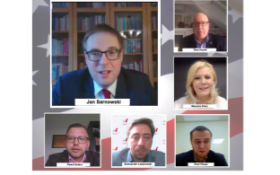- 8 kwietnia 2021
- Category: Community News

On April 8, 2021, during AmCham’s April Monthly Meeting, we have hosted Jan Sarnowski, Undersecretary of State, Minister’s Plenipotentiary for International VAT Cooperation, Ministry of Finance. The meeting’s subject was tax issues, particularly the mode and calendar for implementing corporate taxation changes. Along with Mr. Sarnowski, the meeting was attended by Aleksander Łożykowski, Director of the Income Tax Department, and Paweł Selera, Director of Tax Department of Goods and Services.
The meeting started with the Minister’s emphasis on the “New Deal” document soon to be presented by the Prime Minister. The document will include a broad package of solutions friendly to entrepreneurs and investors, including the vital element of a package of incentives for multinationals looking to relocate their production activities to Poland and support Polish companies in their foreign expansion. A few weeks after the New Deal’s announcement, a series of meetings will be held to discuss the following modules, during which conclusions and comments on the proposed solutions will be accepted. There will be pre-consultations of subsequent regulations lasting up to two months. The proposal for an extended period of cooperation meets the reported need for a more protracted joint work process on the law’s preparation.
The Minister also announced landmark VAT projects, including implementing the e-commerce directive disabling the sale of goods in Poland without VAT by Asian suppliers and the national system of e-invoices. The Ministry is aiming for entrepreneurs to be able to use the system already in Q4’2021. However, the Ministry’s intention is for e-invoices to become a standard and an obligatory part of market settlements by 2023, which would relieve entrepreneurs and allow them to abandon VAT returns, JPK files, and potentially even in the future the split payment mechanism.
Responding to comments and questions raised by AmCham member companies, the meeting discussed the process of creating and implementing the National System of Invoices (KSF). The Ministry confirmed that it is in the final stage of analyzing the comments made by the companies. However, Minister Sarnowski stressed that even when the deadlines for consultations are over, the Ministry’s statements are examined in detail.
There are two tracks of ongoing work on KSF – firstly on legislative solutions, and secondly in the technological sphere, which is the responsibility of the IT Centre of the Ministry of Finance together with the Analysis Department of the National Fiscal Administration (Krajowa Administracja Skarbowa). The tests of the national invoicing system are scheduled for the beginning of September this year. As announced by Mr. Selera, the KSF project, together with the substantive and technological explanations, will be presented in April. The KSF system is the announcement of changes in the structure of the JPK and e-invoices, where it introduces a shift of tags related to e-commerce. The system also eliminates the MPP marker and tidies up the GTU marker issues.
Regarding simplifications in VAT settlements, introduced by the so-called SLIM VAT 2 package, the Ministry is at the stage when external consultations are completed. Considering the legislative process’s pace, the act may enter into force at the beginning of October this year. A set of tax simplifications is also planned in the autumn as the SLIM VAT 3 package.
In the other part of the meeting, there was a discussion about the lump-sum tax settlement scheme on capital companies’ income. As informed by the Ministry of Finance representatives, this payment method has not enjoyed companies’ interest so far. As the pandemic lingers, decisions to invest were suspended or postponed, and the general economic downturn and uncertainty about the future resulted in the inhibition of enterprises’ investment activity. The low interest in the so-called “Estonian CIT” triggered the need for changes in this model. As our guests assured us, the Ministry will present the proposals for specific changes in the perspective of a few weeks. The changes will be both quantitative and qualitative – it has been announced that limited partnerships, limited joint-stock partnerships, and cooperatives will settle the tax under the “Estonian system.” The speakers declared their openness and willingness to cooperate within the scope of working out improvements, increasing the Estonian system’s degree of utilization. The works modifying this system will probably start in May this year.
Minister Sarnowski said when it comes to the announced changes to the withholding tax; the Ministry maintains its desire to implement the announcements that have already been made in the market in 2019. The regulations are ready and correspond to the assumptions presented to the companies. The declaration earlier stated January 2021, but the pandemic still prevented this. One cannot speak of reluctance on the MF part but of an inevitable reality that postpones legislative plans. Considering the current epidemiological situation and the legislative calendar, we have to reckon with quite a distant date of implementing the already worked out changes – it may even be January next year. Mr. Łożykowski, in turn, emphasized that the changes worked out with entrepreneurs were introduced into the project, which includes the announced relief on robotization, exclusion of payments to unrelated entities, and many other elements previously reported.
The Ministry of Finance analyzed comments regarding taxation of internet advertising and prepared solutions in this respect. However, it is difficult to say in what time perspective this topic will appear on the market. The situation in the OECD and the European Commission is changing dynamically. In the EC, the work on digital tax is about to be resumed. In the OECD, in turn, a working group is working, in which multilateral negotiations are underway, in which the American side also participates, introducing several new proposals that will postpone the elaboration of final regulations.
In the end, Minister Sarnowski invited American companies to actively participate in creating effective tax solutions and declared his openness to dialogue and cooperation in all areas in the field of taxation.